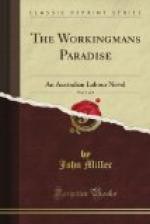Often in the bush it had come to him, lying sleepless at night under the star-lit sky, all alone excepting for the tinkling of his horse-bell: “What is to be the end for me? What is there to look forward to?” And his heart had sunk within him at the prospect. For what was in front? What could be? Shearing and waiting for shearing—that was his life. Working over the sweating sheep under the hot iron shed in the sweltering summer time; growing sick and losing weight and bickering with the squatter till the few working months wore over; then an occasional job, but mostly enforced idling till the season came round again; looking for work from shed to shed; struggling against conditions; agitating; organising; and in the future years, aged too soon, wifeless and childless, racked with rheumatism, shaken with fevers, to lie down to die on the open plain perchance or crawl, feebled and humbled, to the State-charity of Dunwich. He used to shut his eyes to force such thoughts from him, fearing lest he go mad, as were those travelling swagmen he met sometimes, who muttered always to themselves and made frantic gestures as they journeyed, solitary, through the monotonous wilderness. He had flung himself into unionism because there was nothing else that promised help or hope and because he hated the squatters, who took, as he looked at it, contemptible advantage of the bushmen. And he had felt that with unionism men grew better and heartier, gambling less and debating more, drinking less and planning what the union would do when it grew strong enough. He had worked for the union before it came, had been one of those who preached it from shed to shed and argued for it by smouldering camp fires before turning in. And he had seen the union feeling spread until the whole Western country throbbed with it and until the union itself started into life at the last attempt of the squatter to force down wages and was extending itself now as fast as even he could wish to see it. “We only want what is fair,” he had told Nellie; “we’re not going in for anything wild. So long as we get a pound a hundred and rations at a fair figure we’re satisfied.” And Nellie had shown him things which had struck him dumb and broken through the veneer of satisfaction that of late had covered over his old doubts and fears.
“What is to be the end for me?” he used to think, then force himself not to think in terror. Now, he himself seemed so insignificant, the union he loved so seemed so insignificant, he was only conscious for the time being of the agony of the world at large, which dulled him with the reflex of its pain. Oh, these puny foul-tongued children! Oh, these haggard weary women! Oh, these hopeless imbruted men! Oh, these young girls steeped in viciousness, these awful streets, this hateful life, this hell of Sydney. And beyond it—hell, still hell. Ah, he knew it now, unconsciously, as in a swoon one hears voices. The sorrow of it all! The hatefulness of it all! The weariness of it all! Why do we live? Wherefore? For what end, what aim? The selector, the digger, the bushman, as the townman, what has life for them? It is in Australia as all over the world. Wrong triumphs. Life is a mockery. God is not. At least, so it came gradually to Ned as he walked silently by Nellie’s side.




